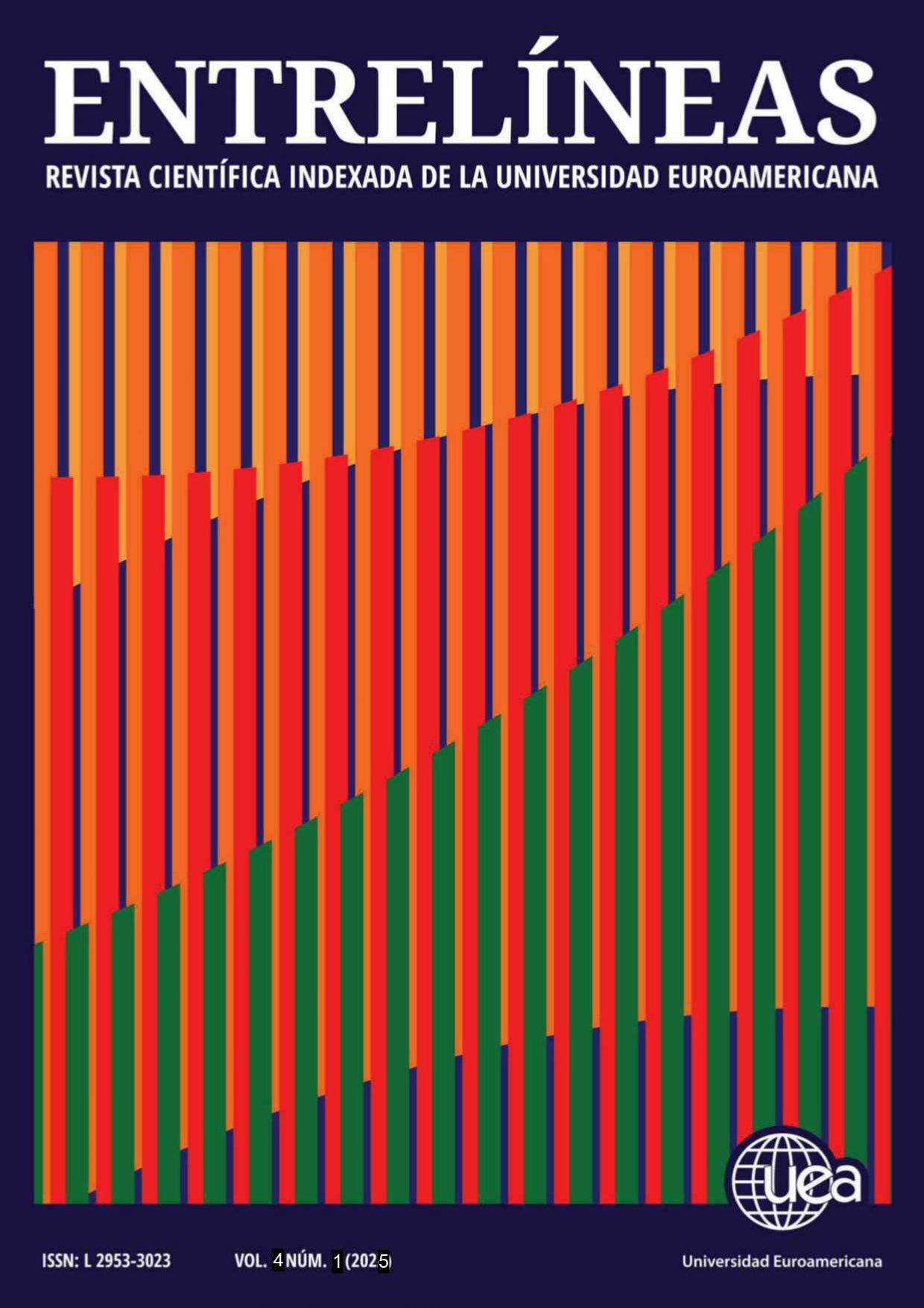Use of artificial intelligence in accounts receivable
DOI:
https://doi.org/10.56368/Entrelineas416Keywords:
financial management, accounting, artificial intelligenceAbstract
Artificial Intelligence (AI) has transformed the accounting sector by enabling process automation, enhancing efficiency, and providing predictive analysis. In today's business environment, its adoption is crucial for maintaining competitiveness and sustainability, as it saves time, reduces costs, and boosts productivity. This study focuses on describing the implementation of artificial intelligence technologies in accounts receivable management, highlighting their impact on operational efficiency and financial decision-making. The research was based on an inductive methodological approach, gathering data through documentary sources and selecting articles related to accounts receivable and artificial intelligence. Despite the challenges posed by its adoption, such as the need for advanced computational resources and concerns about data security, its integration offers tangible benefits. Therefore, it is considered necessary for accounting professionals to adopt a positive attitude and continue improving their skills to adapt to an increasingly automated and technological business environment because artificial intelligence-based tools will not completely replace accountants but rather assist them in evolving into more strategic and managerial roles.
Downloads
References
Anh, N. T. M., Hoa, L. T. K., Thao, L. P., Nhi, D. A., Long, N. T., Truc, N. T. & Ngoc Xuan, V. (2024). The Effect of Technology Readiness on Adopting Artificial Intelligence in Accounting and Auditing in Vietnam. Journal of Risk and Financial Management, 17(1), 27. https://doi.org/10.3390/jrfm17010027
ap Ramanei, T., Abdullah, N. L. & Khim, P. T. (2021). Predicting accounts receivable with machine learning: a case in Malaysia. In 2021 International Conference on Information Technology (ICIT) (156-161). IEEE. https://doi.org/10.1109/ICIT52682.2021.9491773
Appel, A.P., Louzada Malfatti, G., de Freitas Cunha, R. L., Lima, B. & de Paula, R. (2020). Predicting account receivables with machine learning. KDD MLF, 1-9. https://doi.org/10.48550/arXiv.2008.07363.
Bastar, S. G. (2019). Metodología de la investigación. Red Tercer Milenio.
Burgos Chávez, K. M. (2023). Plan estratégico para la recuperación de las cuentas por cobrar del segundo semestre del año 2022 de la empresa industrial Danec SA, en la ciudad Babahoyo [Tesis de Licenciatura]. Babahoyo: UTB-FAFI.
Chi, D. J. & Shen, Z. D. (2022). Using hybrid artificial intelligence and machine learning technologies for sustainability in going-concern prediction. Sustainability, 14(3), 1810. https://doi.org/10.3390/su14031810
Dankhe, G.L. (1986). Investigación y comunicación. McGraw Hill.
Dongre, N., Pandey, A. & Gupta, O.P. (2020). Artificial Intelligence in accounting: opportunities & challenges. J. Xi’an Univ. Archit. Technol, 12, 1858-1864. https://n9.cl/ty3ul
Gómez S., F. R. (2024). Metamorfismo de empresas familiares a corporaciones. Impresoluciones.
Hampton, B. (2020). SSON report. Automating Accounts Receivable Optimising Cash & Collections in Uncertain Times. SSON.
Ikechukwu, O., Nwakaego, D. A. & Celestine, A. (2015). The Effect of cash flow statement on companies profitability (A study of some selected banks in Nigeria). African Journal of Basic & Applied Sciences, 7(6), 350-356. 10.5829/idosi.ajbas.2015.7.6.1156
Jaslove, C. (2017). The rise of artificial intelligence: an analysis on the future of accountancy. Psychology. 18, 1-20. https://n9.cl/htovsf
Kanaparthi, V. K. (2023). Examining the Plausible Applications of Artificial Intelligence & Machine Learning in Accounts Payable Improvement. FinTech, 2(3), 461-474. https://doi.org/10.3390/fintech2030026
Kureljusic, M. & Metz, J. (2023). The applicability of machine learning algorithms in accounts receivables management. Journal of Applied Accounting Research, 24(4), 769-786. https://doi.org/10.1108/JAAR-05-2022-0116
Lapiedra, R., Forés, B., Puig-Denia, A. & Martínez-Cháfer, L. (2021). Introducción a la gestión de sistemas de información en las empresas. Publicacions de la Universitat Jaume I.
Lee, C.S. & Tajudeen, F.P. (2020). Usage and impact of artificial intelligence on accounting: Evidence from Malaysian organisations. Asian Journal of Business and Accounting, 13(1), 213-239. https://doi.org/10.22452/ajba.vol13no1.8
Li, Z. & Zheng, L. (2018). The impact of artificial intelligence on accounting. In 2018 4th International Conference on Social Science and Higher Education (ICSSHE 2018). Advances in Social Science, Education and Humanities Research (ASSEHR), 181, 813-816. https://doi.org/10.2991/icsshe-18.2018.203
Miranda Chicango, K. M. (2020). Proceso contable e información financiera de la distribuidora farmacéutica “Esfarma” SCC, de la ciudad de Santo Domingo, periodo 2019. [Tesis de Ingeniería]. UniAndes.
Odoh, L. C., Echefu, S. C., Ugwuanyi, U. B. & Chukwuani, N. V. (2018). Effect of artificial intelligence on the performance of accounting operations among accounting firms in South East Nigeria. Asian Journal of Economics, Business and Accounting, 7(2), 1-11. 10.9734/AJEBA/2018/4164
Tian, J., & Li, L. (2022). Research on artificial intelligence of accounting information processing based on image processing. Mathematical Biosciences and Engineering, 19(8), 8411-8425. 10.3934/mbe.2022391
Yang, X. (2023). Research on the Application of Big Data Intelligence Technology in the Optimization of Accounts Receivable Management of E-commerce Enterprises Under the Financial Sharing Mode. International Journal of Computational Intelligence Systems, 16(1), 121-131. https://doi.org/10.1007/s44196-023-00293-8
Zheng, M. (2022). Advanced Artificial Intelligence Model for Financial Accounting Transformation Based on Machine Learning and Enterprise Unstructured Text Data. Hindawi Mobile Information Systems, 2022, 1-11. https://doi.org/10.1155/2022 /5708652
Downloads
Published
Issue
Section
License

This work is licensed under a Creative Commons Attribution-NonCommercial 4.0 International License.
You are free to:
- Share — copy and redistribute the material in any medium or format
- Adapt — remix, transform, and build upon the material
- The licensor cannot revoke these freedoms as long as you follow the license terms.
Under the following terms:
- Attribution — You must give appropriate credit , provide a link to the license, and indicate if changes were made . You may do so in any reasonable manner, but not in any way that suggests the licensor endorses you or your use.
- NonCommercial — You may not use the material for commercial purposes .
- No additional restrictions — You may not apply legal terms or technological measures that legally restrict others from doing anything the license permits.










